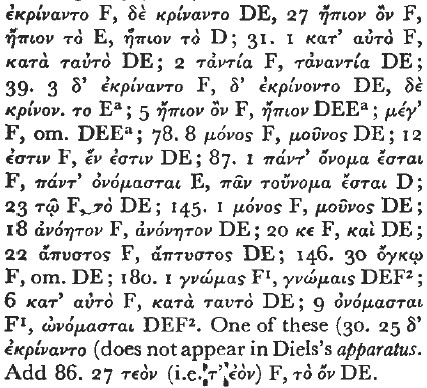Published online by Cambridge University Press: 11 February 2009
The following discussion' of the manuscript tradition of Simplicius' commentary on Aristotle's Physics i-iv originated in an examination of the tradition of the fragments of Parmenides. It is therefore illustrated not only from Simplicius but particularly from the texts of Parmenides quoted by him. This will not be misleading, since, though many of these texts are quoted by Simplicius more than once, there is little or no sign in any manuscript of interpolation from one passage to another and it is not likely that any scribe could have interpolated the text from an independent manuscript of Parmenides.
page 70 note 1 I am greatly indebted throughout my argument to criticism by my colleague Dr. W. S. M. Nicoll.
page 72 note 1 There is some inaccuracy in Vitelli's reporting of both these passages.
page 74 note 1 I owe this point to Dr. W. S. M. Nicoll.
page 74 note 1 P. 30. 25 (Diels) ![]()

page 74 note 1 e.g. Simpl. p. 32. 8 ![]()

page 74 note 1 The figures are approximate, since there are some passages which can be considered borderline cases and others where Diels omits to give the reading of one of his manuscripts. I have included among the readings of EaF accepted by Diels as correct three places in which he adopted the text of DE in his edition of Simplicius but changed his mind in Poetarum Philosophorum Fragmenta and Fragmente der Vorsokratiker (viz. 23. I I, 13, 19) and among the passages where F alone gives the correct reading, one where Diels takes this view in the same works though not in his Simplicius (39. 5).